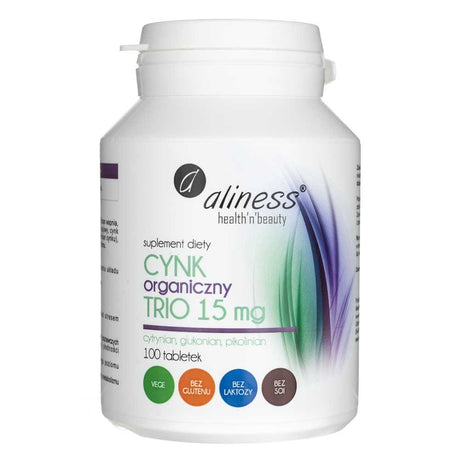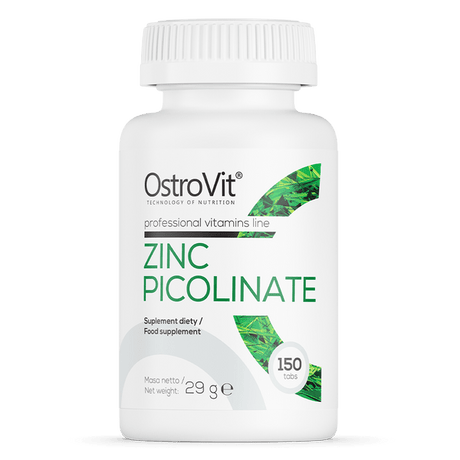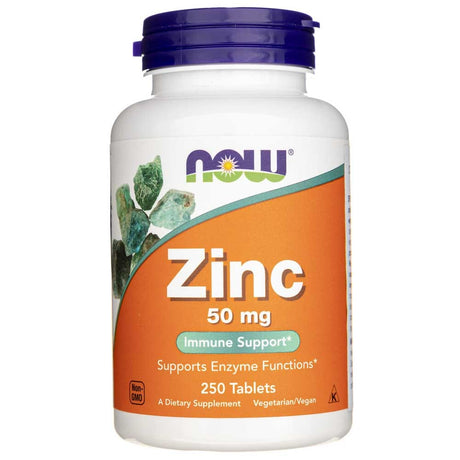Vitaler's
Vitaler's Zinco 15 mg + Selenio 200 mcg - 120 Capsule
Prezzo normale €6.69Prezzo unitario€0.06 / itemNon disponibileSwanson
Swanson Zinco picolinato 22 mg - 60 Capsule
Prezzo normale €3.59Prezzo unitario€0.06 / itemNon disponibileNow Foods
Now Foods Zinco picolinato 50 mg - 120 capsule vegetali
Prezzo normale €11.19Prezzo unitario€0.09 / itemNon disponibileNow Foods
Now Foods Zinco 50 mg - 100 compresse
Prezzo normale €5.49Prezzo unitario€0.05 / itemNon disponibileAliness
Aliness Zinco Trio Biologico 15 mg - 100 Compresse
Prezzo normale €8.29Prezzo unitario€0.08 / itemNon disponibileOstrovit
Ostrovit Zinco picolinato - 150 compresse
Prezzo di vendita €4.31 Prezzo normale €4.79Prezzo unitario€0.03 / itemNon disponibileNow Foods
Now Foods Zinco 50 mg - 250 compresse
Prezzo normale €11.19Prezzo unitario€0.04 / itemNon disponibileDoctor's Best
Doctor's Best PepZin GI, Complesso di zinco-l-carnosina - 120 capsule vegetali
Prezzo normale €37.19Prezzo unitario€0.31 / itemNon disponibileSwanson
Swanson Albion Zinco chelato 30 mg - 90 Capsule
Prezzo normale €5.89Prezzo unitario€0.07 / itemNon disponibileFormeds
Formeds Bicaps Zinco 25 mg - 60 Capsule
Prezzo normale €8.89Prezzo unitario€0.15 / itemNon disponibileVitaler's
Vitaler's Zinco picolinato 15 mg - 120 Capsule
Prezzo normale €4.09Prezzo unitario€0.03 / itemNon disponibileSolgar
Solgar Zinco picolinato 22 mg - 100 compresse
Prezzo normale €12.69Prezzo unitario€0.13 / itemNon disponibileNow Foods
Now Foods Zinco glicinato 30 mg - 120 Capsule molli
Prezzo normale €13.29Prezzo unitario€0.11 / itemNon disponibileAliness
Aliness Zinco diglicinato chelato 15 mg - 100 compresse
Prezzo normale €7.49Prezzo unitario€0.07 / itemNon disponibileNow Foods
Now Foods L-OptiZinco 30 mg - 100 Capsule Vegetali
Prezzo normale €7.89Prezzo unitario€0.08 / itemNon disponibileNow Foods
Now Foods Zinco picolinato 50 mg - 60 capsule vegetali
Prezzo normale €6.99Prezzo unitario€0.12 / itemNon disponibileSolgar
Solgar Zinco 50 mg - 100 compresse
Prezzo normale €9.99Prezzo unitario€0.10 / itemNon disponibileSwanson
Swanson Zinco gluconato 30 mg - 250 compresse
Prezzo normale €11.09Prezzo unitario€0.04 / itemNon disponibileSolgar
Solgar Zinco chelato - 100 compresse
Prezzo normale €11.79Prezzo unitario€0.12 / itemNon disponibileSolgar
Solgar Calcio Magnesio più Zinco - 100 compresse
Prezzo normale €12.79Prezzo unitario€0.13 / itemNon disponibileJarrow Formulas
Jarrow Formulas Zinc Balance - 100 Capsule Vegetali
Prezzo normale €15.29Prezzo unitario€0.15 / itemNon disponibileSwanson
Swanson Zinco Carnosina con PepZinGI - 60 Capsule
Prezzo normale €20.39Prezzo unitario€0.34 / itemNon disponibileFormeds
Formeds Bicaps Zinco 15 mg - 60 Capsule
Prezzo normale €7.69Prezzo unitario€0.13 / itemNon disponibileMedverita
Medverita Selenio 200 mcg + Zinco 15 mg - 120 Capsule
Prezzo normale €7.19Prezzo unitario€0.06 / itemNon disponibile
Zinco: il micronutriente indispensabile per una salute ottimale
Lo zinco è un micronutriente fondamentale con effetti di vasta portata su numerosi processi fisiologici. La sua importanza nel mantenere una corretta funzione immunitaria, promuovendo la fertilità, e sostenendo la salute della pelle, dei capelli, e delle unghie non può essere sopravvalutata. Dato il suo ruolo vitale nel mantenimento della salute e nella prevenzione delle malattie, è essenziale garantire un adeguato apporto di zinco attraverso la dieta o l'integrazione.
Le proprietà uniche dello zinco
Lo zinco è un elemento chimico che il corpo umano non è in grado di sintetizzare da solo, rendendo cruciale l'assunzione attraverso la dieta. Sebbene venga assorbito principalmente attraverso l'apparato digerente, piccole quantità possono entrare nell'organismo anche attraverso l'apparato respiratorio e la pelle. La biodisponibilità dello zinco può variare in modo significativo, influenzata da fattori quali i fitati e l'assunzione di fibre alimentari.
Le principali proprietà e funzioni dello zinco includono:
- Supporto alla sistema cardiovascolare
- Protezione dai radicali liberi
- Regolazione della funzione degli organi interni
- Influenza la stabilizzazione e l'espressione dei geni
- Stimolazione del sistema immunitario
- Mantenimento dell'integrità cellulare
- Influenza l'equilibrio acido-basico
Lo zinco svolge un ruolo cruciale nella composizione delle proteine strutturali ed è ampiamente distribuito in tutto il sistema nervoso, in particolare nel cervello. Qui agisce come modulatore della trasmissione sinaptica, con carenze che possono portare ad alterazioni neuropsichiatriche. Alcune ricerche hanno persino suggerito un legame tra la carenza di zinco e lo sviluppo del morbo di Alzheimer nelle popolazioni anziane.
Gli effetti ad ampio raggio dello zinco sull'organismo
L'influenza dello zinco si estende a numerose funzioni corporee:
- Funzione enzimatica: Lo zinco è un componente vitale di molti enzimi, tra cui la DNA e la RNA polimerasi.
- Sintesi proteica: Svolge un ruolo significativo nella sintesi delle proteine, degli ormoni, e dei globuli rossi.
- Salute della pelle e delle mucose: Lo zinco è essenziale per il corretto funzionamento di questi tessuti.
- Supporto al sistema immunitario: Livelli adeguati di zinco possono contribuire ad alleviare i sintomi e a ridurre la durata di malattie come il raffreddore e l'influenza.
- Salute riproduttiva: Lo zinco è coinvolto nella spermatogenesi e nello sviluppo dei testicoli, garantendo una struttura e un numero di spermatozoi adeguati.
- Salute della pelle: Contribuisce al mantenimento di una pelle sana, aiuta la guarigione delle ferite, e influenza il metabolismo del collagene.
- Salute degli occhi: L'integrazione di zinco ha dimostrato efficacia nel trattamento e nella prevenzione della degenerazione maculare legata all'età (AMD).
- Crescita e sviluppo: Ha effetti benefici sull'aumento di peso, del sistema nervoso, e sullo sviluppo delle ossa.
Fonti alimentari di zinco
Sebbene i prodotti animali siano le migliori fonti di zinco, anche gli alimenti di origine vegetale contengono questo minerale essenziale. Inserite nella vostra dieta questi alimenti ricchi di zinco:
- Frutti di mare (in particolare ostriche)
- Carne (in particolare fegato)
- Pesce
- Uova (in particolare il tuorlo)
- Noci e semi
- Prodotti integrali
- Legumi
Una dieta equilibrata ricca di proteine animali e prodotti vegetali può favorire tassi di assorbimento dello zinco del 20% - 40%. 40%. Tuttavia, un elevato apporto di fibre nella dieta può ridurre significativamente l'assorbimento a circa il 10% - 15%.
Ottimizzare l'integrazione di zinco
Quando si integra lo zinco, il momento è cruciale:
- Evitare l'assunzione di zinco a stomaco vuoto al mattino, in quanto può causare nausea e dolore addominale.
- Assumere lo zinco più tardi nella giornata, tra i pasti piuttosto che durante, per migliorarne l'assorbimento.
- Fare attenzione alle potenziali interazioni con altri nutrienti e farmaci, come il calcio, il ferro, l'ibuprofene, e l'aspirina.
- Consultare un operatore sanitario prima di associare lo zinco ad altri integratori o farmaci.
Conclusione: Abbracciare il potere dello zinco
Lo zinco è un micronutriente potente con effetti ad ampio raggio sulla salute umana. Dal supporto della funzione immunitaria alla promozione della salute della pelle e al sostegno del benessere riproduttivo, lo zinco svolge un ruolo cruciale nel mantenimento della salute generale e nella prevenzione di varie malattie. Comprendendone le proprietà, riconoscendone l'importanza, e garantendone un'assunzione adeguata attraverso la dieta o l'integrazione, è possibile sfruttare tutto il potenziale di questo minerale essenziale.
Esplorate la nostra gamma di integratori di zinco di alta qualità presso Medpak per sostenere i vostri obiettivi di salute e benessere. Ricordate di consultare un professionista della salute prima di iniziare un nuovo regime di integratori, soprattutto se avete condizioni di salute preesistenti o state assumendo farmaci.























